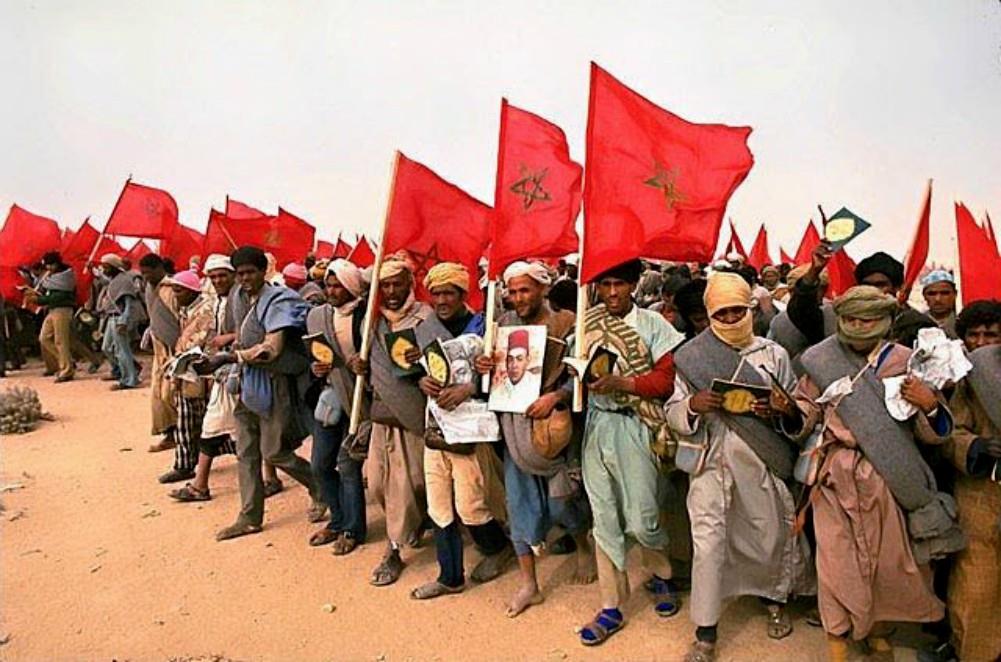Today, Moroccans across the country celebrate the 49th anniversary of the Green March, an iconic event that resonates with deep patriotism and national pride. This historical march not only altered Morocco’s territorial future but also fueled its socio-economic growth, positioning the country as a vital link between Africa and the rest of the world.
The Green March: Morocco’s unforgettable historic journey
On November 6, 1975, King Hassan II led a peaceful movement that reshaped Morocco’s destiny. Holding copies of the Quran and waving the Moroccan flag, nearly 350,000 citizens marched southward, asserting their claim over the Sahara with an unmatched unity and faith. This monumental act not only cemented Morocco’s territorial integrity but also showcased the powerful bond between the Alaouite Throne and the Moroccan people, symbolizing national unity and shared values.

Tradition and modern vision: King Mohammed VI’s legacy
Since ascending the throne, King Mohammed VI has continued this legacy with a bold vision for the southern provinces. His approach has been transformative, prioritizing the Sahara’s economic, social, and geopolitical integration with the rest of Morocco and beyond. Under this vision, Morocco’s southern cities, particularly Dakhla and Laâyoune, have evolved into strategic growth hubs. Ambitious projects like the Dakhla Atlantic Port, the Dakhla-Casablanca power link, and the Tiznit-Dakhla expressway are redefining the region’s infrastructure.
Further strengthening Morocco’s African ties, the planned Africa Atlantic Gas Pipeline with Nigeria represents a historic step in bolstering energy security and economic prospects. This pipeline, along with other cross-continental projects, exemplifies Morocco’s active role in connecting Sub-Saharan Africa with broader global markets.
Laayoune – Morocco
New development model for the Southern Provinces: Progress in action
Since the launch of the New Development Model for the Southern Provinces (NDPS) in 2015, the Moroccan government has invested over 87 billion dirhams in infrastructure, healthcare, education, and employment projects. With over 50% of the 654 projects in motion, growth in regions like Guelmim-Oued Noun, Laâyoune-Sakia El Hamra, and Dakhla-Oued Ed-Dahab has outpaced national averages, ushering in rapid modernization and prosperity.
Among these key projects, the Dakhla Atlantic Port and Tiznit-Dakhla expressway are transforming transport and logistics capacities, making the region more attractive to investors. Additionally, the Dakhla fishing port contributes significantly to Morocco’s maritime production, while the Boucrâa industrial zone, focused on phosphate extraction, boosts the country’s industrial standing. Investments in renewable energy—such as solar, wind, and green hydrogen projects—underscore Morocco’s commitment to sustainable, innovative growth.
Advanced regionalization and autonomy: Toward inclusive governance
Another pillar of Morocco’s development is the advanced regionalization of the southern provinces, granting these areas greater autonomy over local governance. Since 2016, this process has been supported by specific legislative frameworks addressing local needs. By giving these regions a voice in their economic and social planning, Morocco has empowered the provinces to guide their growth in line with national and sustainable development goals.
Largest African bridge in Laayoune – Morocco
Royal Vision for the Atlantic space: A gateway between Africa and the world
Last year, during the Green March anniversary, King Mohammed VI announced a visionary plan to integrate the southern provinces into an Atlantic Space Initiative, designed to link Morocco with the Sahel and secure access to the Atlantic. This initiative seeks to build robust trade connections not only with Africa but also with Europe and the Americas, further reinforcing Morocco’s commitment to a united, economically integrated African continent.
Port of Dakhla – Morocco
Challenges and the future: A national and pan-African cause
Today, Morocco remains unwavering in its resolve to uphold the Moroccan character of the Sahara and ensure sustainable growth in its southern provinces. Through continuous diplomatic, economic, and social initiatives, the Kingdom reaffirms its commitment to a peaceful, sustainable resolution for the region, grounded in respect for Morocco’s territorial sovereignty.
The legacy of the Green March endures as a testament to Morocco’s resilience and ambition, inspiring future generations to carry forth a vision of unity, development, and African solidarity.